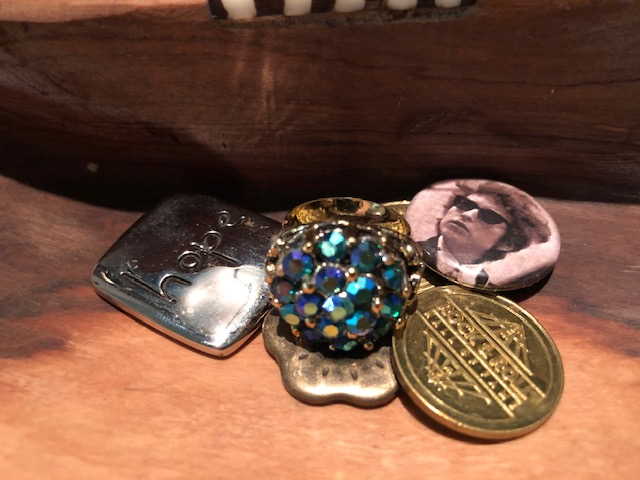Time Capsule

by David W. Stowe
So much crap, so little time, she muttered to herself. It was unbelievable. She’d filled bin after bin but the stuff kept spewing. From closets, desks, cupboards, drawers, chests, crannies, even crawl spaces. The basement was hemorrhaging old junk. How had it gotten to this?
When Angela and Ned moved in, this had been their first house after a succession of apartments. Ned had been determined to keep stuff organized, their space uncluttered, and for a couple of years it had worked. But then they had a baby. And another. Gradually they let the basement slide. They argued more often and took longer to cool down. Ned moved out, then back again before they finally divorced. Then her parents died.
Life had rolled over Angela like a wave, exhilarating yet often punishing, and the small house was now packed to the rafters. Then, one day, she decided it was time to move to New Mexico, a place she’d never lived, a thousand miles away. She was excited for the future but the downsizing was a killer. The housing market was hot. She’d barely listed the house before she got an offer for over her asking price. She accepted and now had all of two weeks to get out.
The first couple days, as each closet and drawer yielded its surprising contents, she foundered under the enormity of the task. But soon enough she developed an M.O. The key was to set up a battery of bins. They evolved into a set of categories.
- Daughter Nell’s stuff
- Son Micah’s stuff
- Ned’s stuff
- Goodwill giveaways
- Recyclables
- Trash
The more she got into the six bins, the less she would have to haul to Albuquerque. It was a good plan, her only hope, she knew, but it still involved staggering numbers of decisions. Basically one per object, and she faced an infinite number of objects. So she queued up an oldies playlist on Pandora and went to work.
She ploughed relentlessly through the rooms, weaving barefoot among the bins housed in different rooms because they wouldn’t all fit in one. The kids’ rooms were killers. Plastic horses, soccer trophies, craft kits used once or twice, dog-eared magazines, Legos, dolls’ outfits without the dolls, tea sets, plastic soldiers, NBA cards, bright plastic thingies.
So many decisions. A rec league basketball tee shirt: Goodwill or Nell? A favorite Berenstain Bears book: charity or Micah? Would the kids want their baby clothing? Ned wouldn’t. As mother, was she expected to save them for possible grandchildren? She guessed somebody was supposed to.
Once she got going with her system, even Goodwill proved complicated, but she managed its process. A lot of the better stuff went to Saint Vincent de Paul. Decent books went to the local library, which still accepted donations. But there was so much stuff she couldn’t imagine being useful: old sheets and towels, used socks, frayed clothing. Angela learned of a company that picked up stuff like that for curbside “recycling,” whatever that meant. Maybe pulped for paper? Who knew?
Like a robot cleaner, Angela cruised ceaselessly among the bins. She couldn’t take more than a few steps without seeing another object that triggered a sudden thought, which required a detour and distracted her from the first. Then a bin would need to be hauled to the garage, where she would see something else. She would need to label the bin with tape, which she realized she had left upstairs and, though it took a while to find it, she spotted something else and made a mental note to bring to a friend. And as she dealt with that, she would remember something upstairs she had decided. And so on.
By mid-afternoon she slipped into a fugue state. Still, by the end of the afternoon, after she’d taken a load to Goodwill, the house felt slightly liberated. She could breathe more easily, like after a hit of albuterol. She’d made progress even if the house looked more chaotic than ever. It wasn’t the first time she had felt this.

The previous summer, she had stood with her friend, Alyssa, in her parents’ living room in Philadelphia. Alyssa’s parents had died that year, both in their nineties. Somehow they had managed to hang on in the old house they had lived in for forty years. Alyssa and her brother had organized a memorial service for them, which Angela had flown in for.
“There’s still so much here,” Angela had said, looking around the house after the service. “What’s going to happen to it all?”
“Not really sure,” Alyssa had replied. “I’ve got my little pile here. George’s is over there.” She gestured to a small table and a hutch, both piled high with objects and books for her brother, George.
“So all the rest of the stuff is going to stay? This house is, like, completely furnished.”
“You’re welcome to take anything like,” Alyssa said. “My house and George’s are so full, we just can’t make room for anything more. The kids don’t have permanent addresses yet. So we hired a company to hold an estate sale, basically.”
Alyssa lingered, wanting to take a second look at some framed photos. “I’ll be just a few minutes.”
“Take your time, my flight’s not until four,” Angela said, then headed for the bookshelves, knowing a few books were about all she could squeeze into her bag.
The old oak shelves were crowded with quality hardcovers, mostly bestsellers and volumes on current events. She already had plenty of paring to do of her own books; she mostly used audiobooks and her tablet anyway. But she took a Joan Didion and an early David Sedaris she’d been meaning to read. She wandered upstairs to find Alyssa going through a stack of art and photos.
“Can you believe these pictures of my dad, just back from the Navy? Here’s his bronze heart.” Alyssa held it up. “One of us should have it, right? The medical diploma that always hung in his office. Look at this, my parents meeting Elie Wiesel.”
“You’re not leaving this behind, are you?” Angela held out a small can of mixed nuts. When she took off the lid a cloth snake boinged out. “That’s so your mom.”
“In a nutshell, right? Sorry.” They both laughed. Angela remembered her friend’s mother who had been a tireless practical joker who’d thought nothing of placing whoopie cushions and fake rubber turds around the house when her kids brought friends over.
“You definitely have room for that somewhere,” Angela said.
“You’re right, and it’s something one of the kids might want. But I’m pretty much done here. Did you find anything you want?”
“Just a couple of books. One looks like a first edition Joan Didion. Is that okay?”
“Of course, anything you like,” Alyssa said. “Look at this great little watercolor my mom painted. You know, we should get going before I get bogged down in memory lane. I don’t want us to cut it close at the airport in rush hour.”
They carried a few framed pieces downstairs and leaned them up against the hutch. They paused at the front door.
“I guess this is it.” Alyssa looked back into the house she’d grown up in, locked the door, dropped the key through the mail slot.

As the memory of being with Alyssa in her parents’ house faded, Angela thought of yet another bin category. She resisted at first, but why not. How much time could it take?
Hitting a wall of decision fatigue, she drove off for a frozen latte and stopped at the Post Office. She helped herself to three Priority Mail boxes from the lobby
Back home, she began a search for life’s greatest hits. Time capsule treasures. She selected birthday cards from over the years. Medals and ribbons. Father’s Day cards hand drawn by toddlers. Toy cars and Little Mermaid figurines. She picked only little stuff that fit in a Priority Box, no more.
Their larger bins would probably stay with her for years to come—who knew when they would be settled enough to collect them, maybe never. This way they could enjoy at least a curated selection.
What happened after they open the boxes was out of her hands. But in that initial moment, at least, they would get a glimpse of their earlier lives. Flashing by, as lives always do. The new sorting category added a layer to her task, but a satisfying one.
Then, at the bottom of one of the cardboard boxes, Angela saw something she’d been missing for years. She’d given up on it, resigned herself to the reality of never seeing it again. An object lesson in impermanence, she’d decided. We’ll all be buried alive if we don’t lose or break most of our stuff along the way.
It was a lacquered jewelry box she’d been given as a girl. It held her most precious shards and fragments of girlhood and beyond: cheap rings, pins and badges, cheap prizes from cereal boxes that had meant everything to her. Her National Honor Society pin. Her first watch, a Timex, from Grandma. The tag from the family dog who’d died when she was twelve. A silver Cross pen her dad had given her. A semi-precious ring handed down from her mother.
Angela couldn’t imagine how it had disappeared, but here it was, buried under stuff in the carton her daughter had filled when she redecorated her room in high school.
She took the jewelry box out to the porch and sank into a chair. She’d pack it in one of the bins headed to Albuquerque, but first she wanted to examine it. For ten minutes she fingered the artifacts. She took her time with each object, some she hadn’t remembered saving. She determined there was nothing of value for anyone but her. Then she had an idea.
Using a garden spade, she dug a hole over in the corner of the yard near where they’d buried a succession of pets over the years. Let’s hope I don’t hit a cat skull, she told herself. Carefully placing the wooden box in the hole, dropped in a few purple hosta blooms, and gently layered some clods of soil over the top. Within a few weeks the excavation would be covered by weeds. Someday a lucky gardener would find it.
David Stowe lives in Michigan and plays drums and saxophone in a western-swing trio called Jackalope. He has published nonfiction books on American music and culture, and recently completed his first novel, Learning from Loons, published by Mighty Mitten Books.


